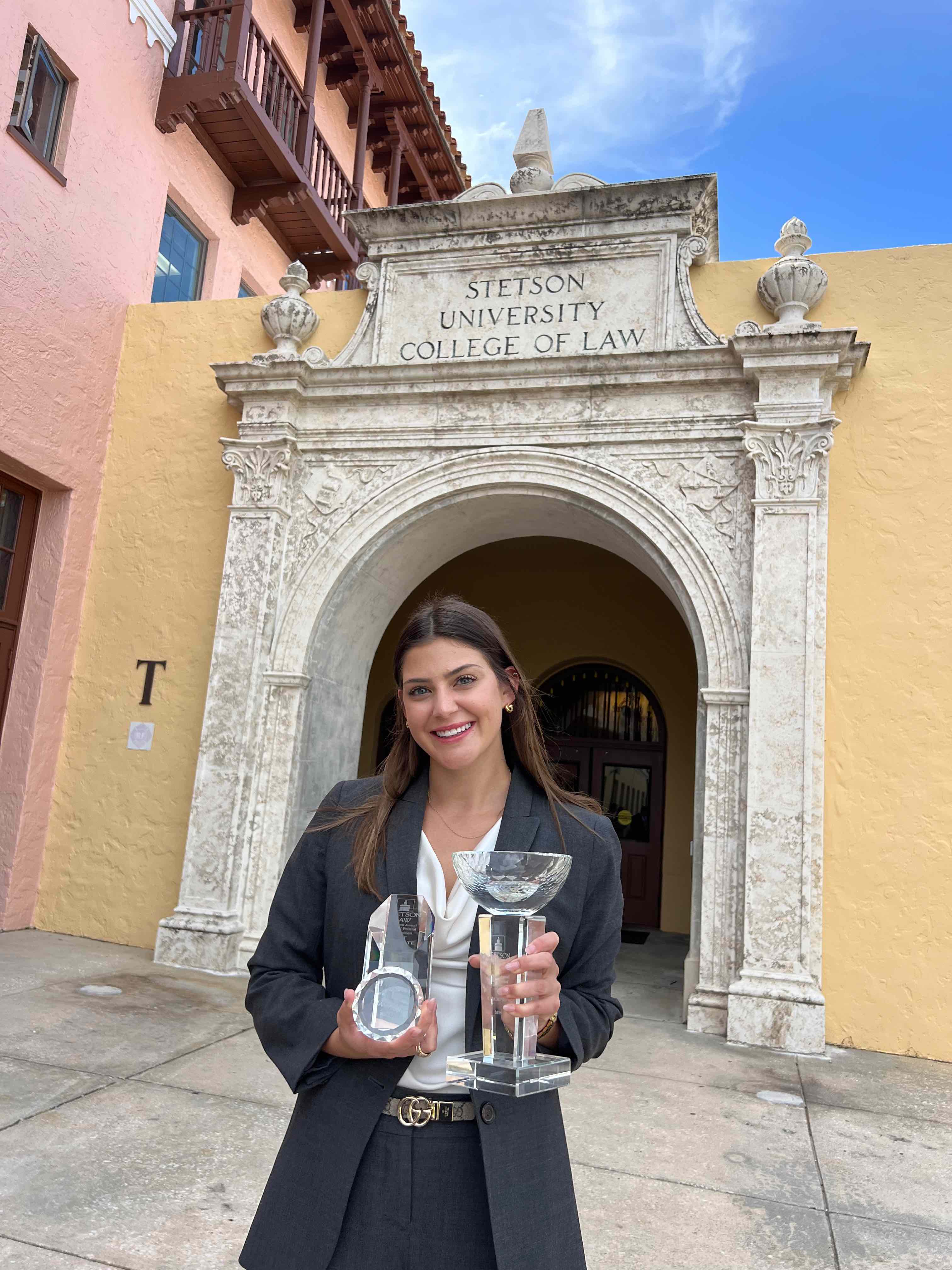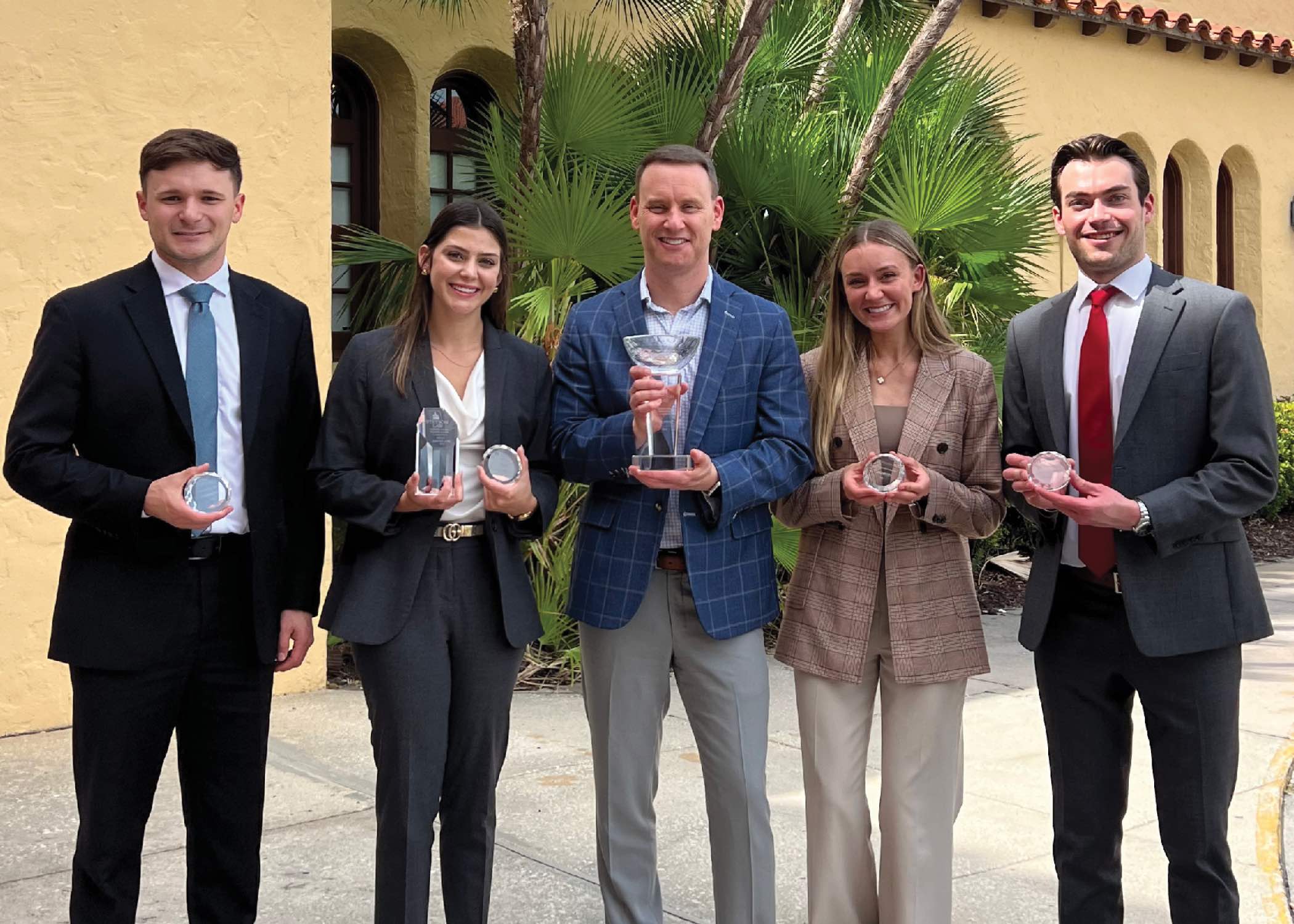Texas Tech Law’s 3L team sweeps the National Pretrial Competition, adding another championship to the school’s legacy of advocacy excellence.

On October 5, four Texas Tech Law 3Ls turned months of preparation into triumph, sweeping the National Pretrial Advocacy Competition at Stetson University College of Law in Gulfport, Florida.
The team of Rachel Behnke, Derek Fisher, Ryder Needham, and Mabry Payne delivered a commanding performance that captured Texas Tech Law’s 57th national advocacy championship in one of the nation’s most prestigious tournaments.
For Behnke, who was also named Overall Best Advocate of the tournament, the victory carried extra meaning.
“Last year, Derek [Fisher] and I narrowly lost in the semifinals, and that experience fueled our determination to come back stronger,” Behnke said. “Every practice, every late night, and every round we competed in was driven by that shared goal of finishing what we started. To stand there this year and hear our team announced as national champions was indescribable—it felt like all the hard work, growth, and persistence finally paid off.”

Her words set the stage for a story shared by all four teammates—one defined by preparation, trust, and teamwork.
“It felt amazing to win given how incredibly hard both our team and Prof. Sherwin worked to prepare,” said Derek Fisher. “What set us apart is how well we supported each other throughout the entire competition. Bringing home a trophy to the law school is something I’ll never forget.”
Ryder Needham emphasized the prestige of the moment and the team’s ability to stand out on the written side of the competition.
“This win meant so much to me because of the prestige of the tournament,” Needham said. “Our brief really set us apart—we had a solid grasp of the issues and communicated our arguments clearly and confidently to the judges. Everyone on our team is such a strong advocate, and that really showed in how we performed.”
The tournament itself demands a rare blend of skills—persuasive writing, mock-trial-style witness examination, and moot-court-style oral argument. This year’s problem centered on a complex employment law dispute at a military institute, challenging advocates to master both written advocacy and courtroom performance.
“This competition is always among the most challenging we enter because I need advocates who are the complete, total package," said Professor Rob Sherwin, Director of Advocacy Programs. "They have to be able to do everything well—write, think on their feet, cross-examine witnesses, react to hostile witnesses—and not only that, I need four of them. Just having one or two great students won’t get it done because the team has to continually switch sides throughout the tournament. So if you have a weakness, it becomes clear very quickly. We didn’t have any weaknesses. Mabry, Ryder, Derek, and Rachel are the complete package."

For Mabry Payne, the months of sacrifice were a powerful reminder of what sets Texas Tech Law’s advocacy program apart.
“For two months, we worked tirelessly as a team, day and night, preparing to face the best in the country,” Payne said. “Before law school, I was afraid of public speaking and unsure of myself. Advocacy competitions have completely changed that for me. I’ve gained skills and confidence I never imagined, and winning this national title validated everything I now believe about myself.”
The results reflected their dedication: the team won every judge’s ballot across six rounds, earned the Best Overall Brief award, defeated the defending national champions in the quarterfinals, and capped the weekend with Behnke’s individual recognition as Overall Best Advocate.
While this marks Texas Tech Law’s fifth title at Stetson in the past 15 years, this year’s performance stands out. Few teams in any competition can claim to have swept every judge’s ballot while also taking home both the individual and written awards.
“I’m so incredibly proud of these students,” said Jack Wade Nowlin, Dean and W. Frank Newton Professor of Law. “Winning a championship like this—and sweeping the field the way they did—shows the remarkable skill, dedication, and teamwork that define Texas Tech Law. It also reflects the outstanding commitment of our coaches and the strength of our entire advocacy program.”
Now back in Lubbock, the students carry more than a national trophy. They carry the lessons, growth, and friendships forged in the crucible of competition—experiences they say will stay with them far beyond law school.
About the National Pretrial Advocacy Competition
The National Pretrial Advocacy Competition (NPTC) is one of the few tournaments in the country that combines written advocacy, pretrial litigation, and oral argument. Teams argue complex evidentiary and procedural issues while examining witnesses in hearings that mirror full trials. Before competing, students prepare detailed memorandums of law on both sides of the case.
The 2025 case centered on Louise Shepard, a faculty member at the fictional Westmoor Military Institute, who claimed she was subjected to a retaliatory hostile work environment after opposing discriminatory practices. Westmoor denied the allegations and raised the Faragher-Ellerth defense, asserting it exercised reasonable care to prevent and correct harassment and that Shepard failed to take advantage of available remedies.
Sixteen schools competed in this year’s field: Baylor, Campbell, Chapman, Charleston, Emory, Mississippi College, LSU, Regent, Texas Tech, Tulane, William & Mary, University at Buffalo, University of Illinois Chicago, University of Miami, University of Richmond, and University of Virginia.
